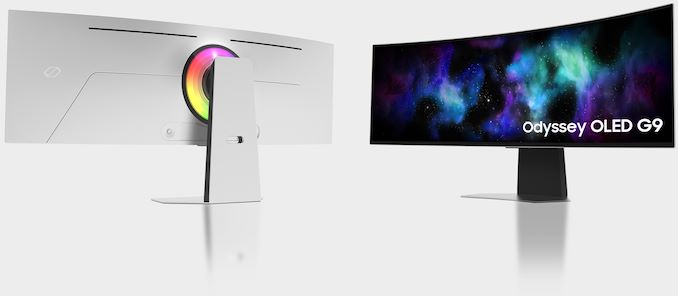
Ahead of CES, Samsung has introduced a new lineup of Odyssey OLED monitors aimed at the gaming market. The Odyssey OLED family all carry AMD’s FreeSync Premium Pro certification for HDR and variable refresh rate support, with a maximum refresh rate of 240Hz or 360Hz depending on the specific model. The lineup includes the curved 49-inch Odyssey OLED G9 model, the flat 32-inch Odyssey OLED G8, and the flat 27-inch Odyssey OLED G6. All three displays are based on Samsung’s quantum dot OLED (QD-OLED) panel type.
The 49-inch curved Odyssey OLED G9 (G95SD model) is Samsung’s flagship OLED monitor for gamers. The product boasts with a screen curvature of 1800R, 32:9 aspect ratio with a resolution of 5120×1440, as well as a variable refresh rate of up to 240 Hz. Since the display uses an OLED panel, it also features a 0.03 ms response time as well as an ultra-high contrast ratio (think of 1,000,000:1).
The other two Odyssey OLED monitors are aimed at more traditional gamers that look for a flat display. The 32-inch Odyssey OLED G8 (G80SD model) features a 3840×2160 resolution, an up to 240 Hz refresh rate, and a 0.03 ms response time, whereas the 27-inch Odyssey OLED G6 (G60SD model) offers a 2560×1440 resolution, a 360 Hz peak refresh rate, and a 0.03 ms response time.
While Samsung has not touched upon maximum brightness of its new OLED displays, they all carry VESA’s DisplayHDR True Black 400 certification, so expect them to support HDR10/HDR10+ as well as at least 400 nits maximum luminance in HDR mode. Also, since they carry AMD’s FreeSync Premium Pro badge, they can also enable low-latency HDR gaming as Radeon hardware and software will do tone mapping themselves bypassing built-in scaler.
| 2024 Samsung Odyssey OLED Monitors | |||
| G9 (G95SD) | G8 (G80SD) | G6 (G60SD) | |
| Panel | 49″ QD-OLED | 32″ QD-OLED | 27″ QD-OLED |
| Native Resolution | 5120 × 1440 | 3840 × 2160 | 2560 × 1440 |
| Maximum Refresh Rate | 240 Hz | 240 Hz | 360 Hz |
| Response Time | 0.03 ms (GtG) | 0.03 ms (GtG) | 0.03 ms (GtG) |
| Brightness | minimum: ? cd/m² typical: ? cd/m² maximum: at least 400 cd/m² |
minimum: ? cd/m² typical: ? cd/m² maximum: at least 400 cd/m² |
minimum: ? cd/m² typical: ? cd/m² maximum: at least 400 cd/m² |
| Contrast | 1,000,000:1 | ||
| Viewing Angles | 178°/178° horizontal/vertical | ||
| Pixel Pitch | 0.234 mm² | 0.1845 mm² | 0.234 mm² |
| Pixel Density | 109 ppi | 138 ppi | 109 ppi |
| Display Colors | ? | ? | ? |
| Color Gamut Support | DCI-P3: ? sRGB/Rec 709: ? Adobe RGB: ? SMPTE C: ? Rec2020: ? |
DCI-P3: ? sRGB/Rec 709: ? Adobe RGB: ? SMPTE C: ? Rec2020: ? |
DCI-P3: ? sRGB/Rec 709: ? Adobe RGB: ? SMPTE C: ? Rec2020: ? |
| Stand | ? | Tilt, height, swivel, and privot adjustable | |
| Inputs | 2 × HDMI 2.1, DP 1.4, USB Hub | ||
| Availability | 2024 | ||
The latest trio of Samsung’s Odyssey OLED monitors offers extensive physical connectivity options, including a DisplayPort 1.4 input, two HDMI 2.1 ports, and a USB hub. The G80SD and the G60SD models also come with a height-adjustable stand that provides added flexibility with tilt, swivel, and pivot control points and all three feature a VESA mount.
To make its Odyssey OLED displays more universal, Samsung equipped them with the Samsung Smart TV platform (to access things like Netflix and YouTube), Samsung Gaming Hub (to access cloud streaming gaming platforms like GeForce Now or Xbox), SmartThings Hub (to control compatible Smart Home and IoT devices), and Multi Control capability (to transfer images and/or text between the display and compatible laptop, tablet, and smartphones).
Samsung’s new Odyssey OLED displays are set to be available later this year. Prices are currently unknown.








